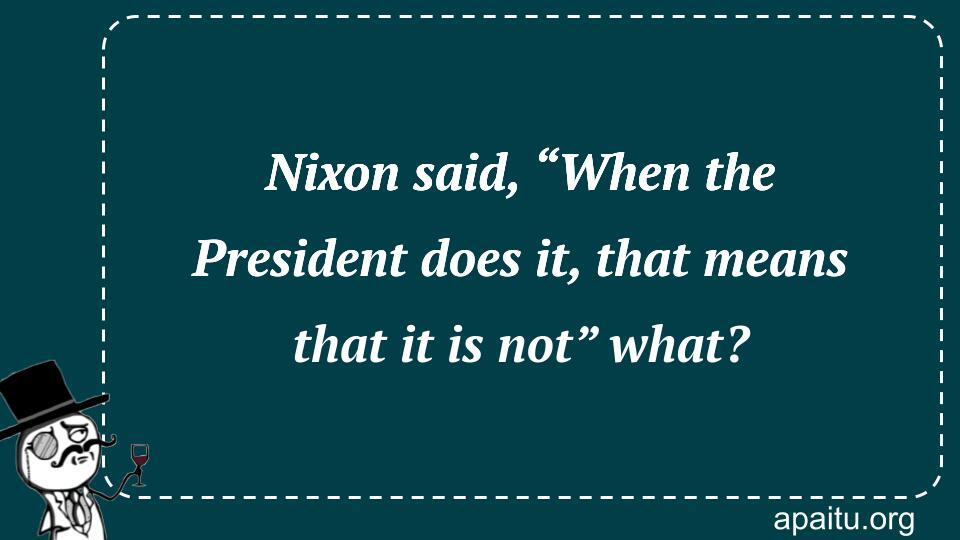Question
Here is the question : NIXON SAID, “WHEN THE PRESIDENT DOES IT, THAT MEANS THAT IT IS NOT” WHAT?
Option
Here is the option for the question :
- Illegal
- Wrong
- A mistake
- False
The Answer:
And, the answer for the the question is :
Explanation:
David Frost asked President Richard Nixon the following question during their televised interview in order to gain clarity: “So, what in a sense you’re saying is that there are certain situations, and the Huston plan or that part of it was one of them,” Frost said. “Where the President can decide that it’s in the best interest of the nation or something and do something illegal.” In his statement, Richard Nixon revealed how he thought of the privileges that came with his position as President when he said, “Well, when the President does it, that means that it is not illegal.”

“When the President does it, that means that it is not” – these words spoken by President Richard Nixon encapsulate a controversial perspective on executive power and the rule of law. The statement implies that actions undertaken by the President are exempt from being deemed illegal, simply by virtue of the President’s involvement. This assertion, made during an interview with David Frost in 1977, sparked considerable debate and raised fundamental questions about the limits of presidential authority and the accountability of those in power.
Nixon’s statement reflects a belief in the concept of executive privilege, which asserts that the President has the authority to withhold information and exercise certain powers without fear of legal consequences. According to this perspective, the President’s actions are inherently lawful and justified by the responsibilities and prerogatives of the office. However, this interpretation stands in direct contrast to the principles of checks and balances and the notion that no one, including the President, is above the law.
The context in which Nixon made this statement is crucial to understanding its significance. It came years after the Watergate scandal, during which Nixon’s involvement in the cover-up of illegal activities was exposed. The scandal led to the resignation of President Nixon and a profound crisis of trust in the government. The statement reflects a mindset that seeks to justify and rationalize actions that may otherwise be considered unlawful or unethical.
Nixon’s assertion of immunity from legal consequences for presidential actions sparked a fierce debate among legal scholars, political analysts, and the general public. Critics argue that such a perspective undermines the foundations of democracy and the rule of law. They contend that no individual, including the President, should be immune from accountability and that the principle of equality before the law must apply universally.
The statement also raises questions about the separation of powers and the role of the judiciary in interpreting the law. In a system of checks and balances, the courts play a crucial role in determining the legality of actions taken by the executive branch. Nixon’s assertion challenges this principle by suggesting that the President has the authority to unilaterally define what is legal, potentially bypassing the judicial process.
The legacy of Nixon’s statement extends beyond his presidency. It serves as a reminder of the importance of a robust system of checks and balances, as well as the need for transparency and accountability in government. The statement has influenced subsequent discussions on executive power, particularly in times of crisis or national security concerns. It prompts a reflection on the delicate balance between providing the President with the necessary tools to govern effectively and ensuring that power is not abused or used to subvert the rule of law.
In the af